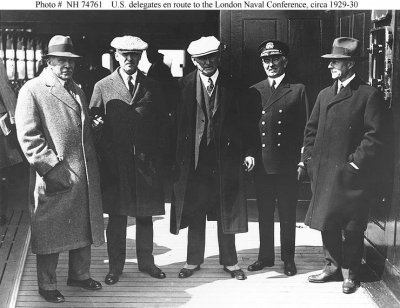The Washington Naval Treaty, also known as the Five-Power Treaty, was a treaty signed during 1922 among the major Allies of World War I, which agreed to prevent an arms race by limiting naval construction. It was negotiated at the Washington Naval Conference, held in Washington, D.C., from November 1921 to February 1922, and it was signed by the governments of Great Britain, the United States, France, Italy, and Japan. It limited the construction of battleships, battlecruisers and aircraft carriers by the signatories. The numbers of other categories of warships, including cruisers, destroyers, and submarines, were not limited by the treaty, but those ships were limited to 10,000 tons displacement each.
The treaty was concluded on February 6, 1922. Ratifications of that treaty were exchanged in Washington on August 17, 1923, and it was registered in the League of Nations Treaty Series on April 16, 1924.Later naval arms limitation conferences sought additional limitations of warship building. The terms of the Washington Naval Treaty were modified by the London Naval Treaty of 1930 and the Second London Naval Treaty of 1936. By the mid-1930s, Japan and Italy renounced the treaties, while Germany renounced the Treaty of Versailles which had limited its navy. Naval arms limitation became increasingly difficult for the other signatories.
The London Naval Treaty, officially the Treaty for the Limitation and Reduction of Naval Armament, was an agreement between the United Kingdom, Japan, France, Italy, and the United States that was signed on 22 April 1930. Seeking to address issues not covered in the 1922 Washington Naval Treaty, which had created tonnage limits for each nation's surface warships, the new agreement regulated submarine warfare, further controlled cruisers and destroyers, and limited naval shipbuilding.
Ratifications were exchanged in London on 27 October 1930, and the treaty went into effect on the same day, but it was largely ineffective.The treaty was registered in League of Nations Treaty Series on 6 February 1931.

1930Oct, 27
Ratifications exchanged in London for the first London Naval Treaty, signed in April modifying the 1925 Washington Naval Treaty and the arms limitation treaty's modified provisions, go into effect immediately, further limiting the expensive naval arms race among its five signatories.
Choose Another Date
Events on 1930
- 12Mar
Salt March
Mahatma Gandhi begins the Salt March, a 200-mile march to the sea to protest the British monopoly on salt in India - 6Apr
Salt Satyagraha
Gandhi raises a lump of mud and salt and declares, "With this, I am shaking the foundations of the British Empire," beginning the Salt Satyagraha. - 7Jul
Hoover Dam
Industrialist Henry J. Kaiser begins construction of Boulder Dam (now known as Hoover Dam). - 6Sep
Hipólito Yrigoyen
Democratically elected Argentine president Hipólito Yrigoyen is deposed in a military coup. - 24Oct
Getúlio Vargas
A bloodless coup d'état in Brazil ousts Washington Luís Pereira de Sousa, the last President of the First Republic. Getúlio Vargas is then installed as "provisional president".

 English
English  español
español  français
français  português
português  русский
русский  العربية
العربية  简体中文
简体中文 